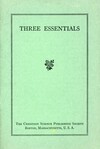

Are you sure?
This bookmark will be removed from all folders and any saved notes will be permanently removed.
"Fret not thyself"
The writer of the thirty-seventh Psalm could not possibly have known to what a vast number of people in the world his assurance of God's goodness would bring comfort. There can hardly be one of the many millions of students of the Bible in the world during past centuries who has not many times turned to this Psalm for renewal of faith in the Lord. The sentiments have been set to music, and generations have listened to the comforting words, "O rest in the Lord, wait patiently for Him, and He shall give thee thy heart's desires."
It is therefore worth while to take this single admonition of the Psalmist and consider its import: "Fret not thyself because of evildoers." The question is, Why should anyone allow his happiness to be corroded or worn away because he is either envious regarding evildoers or irritated over their temporary success? A verse in the King James Version of the Bible says, "Thou makest his beauty to consume away like a moth;" but the version of the English Prayer Book brings out the clearer analogy, translating it "like as it were a moth fretting a garment." To fret is to eat into, corrode; to wear away, to chafe, to irritate. The mental state of fretting is a state of inward annoyance, irritation, perhaps resentment. It is harmful to the individual, disagreeable and hurtful to others. Therefore, the admonition should be continually remembered, "Fret not thyself."
If one were asked the cause of his unhappiness and replied that he was irritated "because of evildoers," he should not consider that a reasonable answer. Right doers can be happy because of their righteous activities. It seems true, however, that the conversation of the righteous is frequently overmuch occupied with curiosity as to wrongdoers. In this discussion there is fear also, but likewise a certain fascination, as if wrongdoing were interesting. A young man who had begun his studies as a theological student visited a large city for the first time. He wrote frankly to a friend saying he wished he had come to the city before he was converted, since he had learned of so many interesting things he would like to have done which now he felt were prohibited. Observation through a long life shows, however, that the apparent success of the evildoer is temporary. In a play where the third act brings retribution or reward, it is intended to represent life wherein retribution arrives, correcting the wrongdoer. Experience shows that they come to a wrong conclusion who believe that evil is power. There are literally thousands of illustrations to be found as to the correctness of the proverb, "Resist the devil, and he will flee from you." In cases unsettled, the only conclusion that can be drawn is that more moral courage is needed. Here is where the Christian Scientist ought to come to the rescue of his community. When crime is met courageously it loses its boldness. Criminals are greatly in the minority, and when a majority decide in favor of right doing and law-abiding, the decision is inevitably effectual. One difficulty seems to be that after a community is victorious over notable wrongdoing, the moral glow seems to subside again, and then wrong habits of conversation once again assume strength. People talk too much about the errors of others. They discuss faults and peccadillos, acts wrong or unfashionable, dishonesties clever or sordid. There are happy possibilities in speech and human intercourse when there comes a cessation of such fretful talk, and conversation can have the flavor of the thought of Jesus when he said to a repentant and sorrowful one, "Neither do I condemn thee: go, and sin no more."
Enjoy 1 free Sentinel article or audio program each month, including content from 1898 to today.
JSH Collections
This article is included in:
1935 - PAMPHLET
Three essentials
JSH-Online has hundreds of pamphlets, anthologies, and special editions for you to discover.

June 3, 1933 issue
View Issue-
"Fret not thyself"
WILLIAM P. MC KENZIE
-
"God anoints and appoints"
MARGUERITE SCOTT TILL
-
The Christian Science Monitor—Peacemaker
LENA HULME
-
A Measuring Rod
ROBERT A. CURRY
-
Preparing for Attendance at Church
HELEN F. WELCH
-
One Increasing Purpose
ARTHUR NOËL SHAW
-
Loyalty
MARTHA MAY SMITH
-
Deliverance
EDNA WISE WEST
-
A column writer for the Record, in whimsical mood, recently...
Ray B. Delvin, Committee on Publication for the Province of Quebec, Canada,
-
In your issue of December 1 appears an article which purports...
Aaron E. Brandt, Committee on Publication for the State of Pennsylvania,
-
A recent issue contains a letter on the subject of Christian Science
Charles W. J. Tennant, District Manager of Committees on Publication for Great Britain and Ireland,
-
A Christian
HAZEL HARPER HARRIS
-
Holding Thought Steadfastly to Good
Duncan Sinclair
-
Logical and Consistent Christianity
W. Stuart Booth
-
The Lectures
with contributions from Gordon V. Comer, Mary C. Lowe, Thomas Ithamar Klyce, Capt. Theodore J. Deans, Mabel M. White
-
During the years spent in my native country I had a great...
Mathilde Caumont Collins
-
In 1916 I was in a sad condition mentally and physically
Susie Webster
-
I should like to express my deep gratitude for all the...
Grace Coad with contributions from Valerie Grace Coad
-
In October, 1901, Christian Science was presented to me...
Rose M. Gleason
-
As I look back over the many years during which Christian Science...
Leone Gage Parker
-
I am most grateful for the opportunity of expressing my...
Clement V. Clifford
-
Signs of the Times
with contributions from Kenneth Mackenzie, Clarence R. Skinner, Allen Clay Lambert, Daisy C. Breeden


